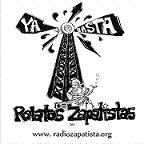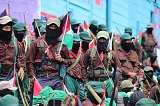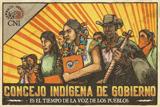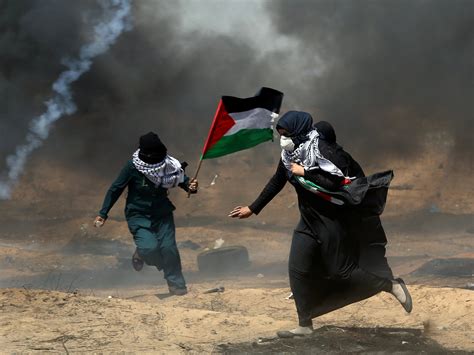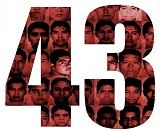
United States
South Central Farmers remember the aggressive eviction that took place 5 years prior
On June 11th, 2011, the South Central Farmers remember the aggressive eviction that took place 5 years prior. After having cultivated what was thought to be the largest urban farm in the United States, the Los Angeles Sheriffs Department carried out an eviction imposed by owner and developer of the plot, Ralph Horowitz. For nearly 14 years, the South Central Farmers worked the 14-acre plot that was located in the heart of the Alameda Corridor by the community of South Central Los Angeles, feeding hundreds of families in the community and providing a model for autonomous greenspace in urban areas. This is a brief update discussing where the South Central Farmers are currently in there struggle to get back their land.
Relatos Zapatistas in July: Interviews on Austerity and the “Drug War”
On this month’s show we bring you three in-depth interviews: 1) Oakland librarian “Agnes” on public libraries in a time of austerity, when 14 of 18 libraries were threatened with closure; 2) reporter and author John Gibler on his new book, To Die in Mexico, which analyzes the so-called “drug war” in Mexico; and 3) two compañerxs from UA in the Bay announce the Anarchist General Assembly that will take place on July 16, along with an update on the continuing occupation of Glen Cove. (2 hrs, mp3)
Four audio files are available here: 1) the full show; 2) interview on libraries and austerity (28 min); 3) interview with John Gibler (42 min); 4) interview on Anarchist General Assembly (14 min).
Autonomía y Austeridad / Relatos Zapatistas en junio
This month’s program, broadcast on June 5, tries to think through the relationship between two concepts: autonomy and austerity. Here we’ve uploaded two interviews as separate segments/files that can be easily downloaded and listened to. The first (both in Spanish and translated into English) deals with the so-called “Spanish Revolution,” the massive popular mobilizations against the electoral system that have been taking place in Spain since May. The second focuses on a series of actions organized against austerity politics and their local manifestations. The two interviews also reflect on the question of how best to articulate an anti-austerity politics that’s at the same time anti-state.
The audios are also available on the Indybay website: 15-M Español, 15-M English, and austerity.

Mumia Abu-Jamal: Racial Imprisonment
Speech written by Mumia Abu-Jamal for a conference titled PRISONMENT OF A RACE
The conference was held at Princeton University on March 25th, 2011
Dear Friends, Activists, Scholars and Colleagues: On A Move!
Thank you for your invitation to join you and to participate in this conference. It is an honor to share these brief moments with you – a nod and a salute to your panelists, many of whom I know and admire.
Your topic, is, to say the least, a daunting one, for the sheer numbers are breathtaking, especially when you consider its familial, social, communal and political impacts. I dare say, for those among you who are African-American, no matter your class or income, you won’t have to think very long to recall a nephew – and far too often a niece – (not to mention a son or daughter!), who, if not presently a prisoner, is then an ex-prisoner of some country, state or federal system.
That speaks to the ubiquity of the problem, of the vast numbers of men, women and juveniles who populate the prison industrial complex here in America. As many of you know, the U.S., with barely 5% of the world’s population, imprisons 25% of the world’s prisoners. As Michelle Alexander (whom many of you will hear from in this conference’s evening program) has noted, the numbers of imprisoned Blacks here rivals and exceeds South Africa’s hated apartheid system during its height.
We shouldn’t take this analogy lightly, for the South African apartheid was the epitome of the racist police state, second only to Nazi Germany in its repellent nature. Moreover, much of its energy was consumed in a de facto war (or, at the very least, in military-espionage jargon, a low-intensity conflict) with the Black majority that criminalized almost every feature of African independent life, restricting places to live, work, study and even love.
This speaks to how blind we are in this country to the scope of the problem (much less its resolution), and how it has been normalized in social and political consciousness, in part because the corporate media neglects or slants such a story; for if they can fail in reportage leading to a hot war (here I mean Iraq) they certainly can fail in reporting the parameters of a low-intensity conflict that crushes Black lives. Perhaps the words of a non- American (I hesitate to call him a foreigner), but long an observer of this country, can give us some insight. At 71 years, South Africa’s great musical gift, Hugh Masekela gave an interview in which he made note of the post-apartheid South Africa: “The majority of the population only got the right to vote and a lack of harassment from the police. But any further changes would be bad for business. Same like here in the United States – the fruits of the Civil Rights Movement are very minimal.”
I quote Masekela here not merely because of his celebrity (nor because I love his music), but because he, like millions of Africans, lived under the madness of apartheid, (even though he escaped it by later moving abroad) and therefore knows it intimately. He therefore is able to recognize its elements in American life. Buy why is apartheid seen as so repellent and the U.S. prison industrial complex (PIC) seen as benign?
I think the answer is twofold: 1) the political elites of both [U.S.] political parties reached bi-partisan consensus on this issue; and 2) the presence of Black political actors in various offices act as a shield repelling attacks on the racist nature of the system.
As in South Africa, Black political elites have benefited from an economic system that is profoundly unfair to the vast majority of African people, especially the poor and working-class. Thus, race protects a class divide, and despite its imagery, social inequality. In essence, the post-apartheid regime achieved a result that the apartheid era tried to, but failed to construct: a buffer class that protected the lands, property and material wealth of the white minority settler class.
It is one of the ironies of history that the government led by the African National Congress (ANC) would achieve this result, albeit by negotiated settlement.
Let us depart from theoretical political constructs to note an example of the real. Several months ago, a police squad raided a Black working-class home, shot into it from outside, and killed a Black child. That, in itself, unfortunately, can’t be called noteworthy. Yet it has a certain resonance when we note that both the mayor of the city, and its police chief, were Black. Those aware of this incident may recognize the name of the beautiful child involved, Aiyannah Jones, I believe, and the city: Detroit. Surely this provides some insight into the political function of Black leaders, and their impotence when it comes to curbing state action that endangers Black poor life.
One of the keynoters, law professor Alexander addresses some of these points in her book, but what had the best salience for me was something that I’ve not seen in any of the reviews I’ve read (understanding that as most prisoners don’t have computer access, I’ve probably missed scads of reviews). It was her observation that the Black working-class/poor constitute a caste position in U.S. society.
In a nation that promotes democracy, one would think the charge that a distinct racial caste exists at the heart of it would provoke controversy. Judging from what I’ve read, this central point has been glossed over.
In closing, I, of course, commend her book to you all for study, but I must do more.
We must call for, agitate for, and if all else fails, create a new popular movement that struggles to break this caste system, once and for all. Indeed, it is in our collective interest to do so. For most Black scholars, intellectuals, academics and political elites are one generation removed from the ghettoes of distant memory. With the collapse of the U.S. economy, where do you think the cuts will occur, as the welfare state – and the State itself – shrinks?
Finally, we know that the impact of felon disfranchisement laws led, inexorably, to the election of George W. Bush, in 2000. Think of what the world may’ve looked like, if that political event didn’t happen.
It is in the interest of all.
I thank you. On A Move!
Mumia Abu-Jamal, M.A.
Death Row, Pa.

From New York: As migrants, we are also sick of this shit
AS IMMIGRANTS, WE ARE ALSO SICK OF THIS SHIT.
We are Movement for Justice in El Barrio, an organization of Mexican immigrants that fights for human dignity and against neoliberal displacement in East Harlem, New York. We fight for the liberation of women, indigenous peoples, lesbians, gays, the transgender community, and immigrants. We, too, as immigrants are sick of this shit (estamos hasta la madre)… as are all those from below in our beloved Mexico.
Our pain and solidarity indignation is with all the people who, due to the bad government’s war – deceitfully disguised as a “war against narco-trafficking”—, have lost their sons, daughters, sisters, brothers, mothers, fathers, relatives, and friends.
As immigrants, we are also the targets of the bad government’s wars and we are being attacked from all sides. First, by the capitalist system and the political class of Mexico that, through the PAN, PRD, and PRI political parties, forms the bad government. They have launched a war against our Mexico. Like all our fellow Mexican immigrants who are here on the “other side,” we migrated for this very reason. It is a war against the poor caused by the multinational corporations and their political lackeys.
As immigrants, we are sick of this shit because the bad governments, from both sides of the border, and the transnational corporations are colluding in the destruction of our peoples and our lands by changing laws to allow the further exploitation and enslavement of humanity.
As immigrants, we are sick of this shit because unemployment and slavery jobs force us to leave our beloved people of Mexico.
As immigrants, we are sick of this shit because the bad government’s war is killing off our culture; they want to destroy every facet of us as a community and as human beings.
As immigrants, we are sick of this shit because the only option our country leaves for us is to risk our lives a thousand times over and leave everything behind in order to arrive in this country, the U.S., which plunders our natural resources and in this way enjoys a level of life infinitely higher than our country.
As immigrants, we are sick of this shit because it all occurs due to our corrupt governments, who are the lackeys of transnational corporations and who continue to kiss their feet so that they may get fat off of our poverty.
As immigrants, we are sick of this shit because the bad government of Mexico and its employees laugh in our faces as they force us to say goodbye to our families, our community, and our beloved Mexico, when those from above exile us.
As immigrants, we are sick of this shit because here on the other side, we are turned into cheap labor to the benefit of the bosses, the wealthy and, in the same way, in service of the State—all of which profit from the savage exploitation of our community.
As immigrants, we are sick of this shit because the political and economic system continues to degrade us as human beings.
As immigrants, we are sick of this shit because, in exchange for our labor, they implement new anti-immigrant and racist laws, murderous border walls, barriers on the Evros River, floating detention centers and armies in the Aegean Sea, assault battalions in the cities and large-scale deportations.
As immigrants, we are sick of this shit because we have seen how the politicians have degraded, exploited, looted, plundered, and murdered our people in Mexico and our fellow immigrant compañeros.
As immigrants, we are sick of this shit because the transnational corporations, aided by the bad government’s war, are destroying the lands and natural resources that belong to the original peoples of our Mexico.
As immigrants, we are sick of this shit because we are discriminated against, humiliated, marginalized, and oppressed for being women, lesbians, transgender, gays and indigenous peoples.
Movement for Justice in El Barrio holds the bad government of Mexico and the world capitalist system directly responsible for the war that keeps us in the conditions we face as immigrants; for the war that seeks to destroy our families, children, women, men, elderly, and youth who, in reality, sustain the economy of the big cities to the benefit of the transnational corporations and bad governments in power on both sides of the border.
As immigrants, we are sick of this shit because the war of those from above uses the mass media, controlled as they are by the bad government, to manipulate public opinion and to conceal the exploitation and true information, always to accommodate the interests of the corrupt governments.
As immigrants, we are sick of this shit because the political and economic system, which wages a war against our population to destroy us, is the root cause and culprit for the exploitation of human beings as cheap labor.
As immigrants, we are sick of this shit because the bad government’s war is degrading our humanity, is killing our culture, desires to enslave us in its image, and wishes to obliterate us in ever facet as a community and as human beings.
As immigrants, we are sick of this shit because the capitalist system moves its money from one country to another, from one continent to another, because for money there are no walls, there are no borders, there are no immigration laws. For money: freedom exists. For us: only persecution and exploitation.
As immigrants, we are sick of this shit because those from above want to convince workers that we represent a threat to them; that we are responsible for the oppression that their very own governments inflict upon them.
As immigrants, we are sick of this shit because they implement all of this to deny us our right to live a dignified life as human beings with all the rights that they don’t want us to exercise.
As immigrants, we are sick of this shit because we were displaced and evicted from our beloved Mexico and here we are now facing and fighting yet again displacement from our homes and community. Or, in other words, we are being doubly displaced, and for this reason, our struggle will not be stopped: it is strengthened together with our sisters and brothers of The Other Campaign.
As Mexican immigrants, we are part of The Other Campaign, the national Mexican movement – initiated by our Zapatista sisters and brothers from Chiapas, Mexico – that aims to unify all the struggles from below and to the left. This movement changes the way of doing politics by having the community as a base. We want to get rid of those thieving, corrupt, and dirty politicians from our Mexico, since all they do is plunder and leave our country in ruins. But, as our Zapatista sisters and brothers say, “If there is no world for us, by respecting our differences, we will build one in which many worlds fit.”
As immigrants, we are sick of this shit because whenever the people, those from below, unite and fight against the capitalist system and political class, those from above attempt to squash our struggles as organized and autonomous peoples with repression, as they have done to members of The Other Campaign, such as our beloved sisters and brothers Zapatistas and our beloved compas from San Sebastián Bachajón.
As immigrants, we are sick of this shit because instead of shelter, land, jobs, food, health, education, independence, democracy, freedom, and peace, there is superfluous brutality, violence, displacement, poverty, hunger, and repression. Instead of life, there is death.
Now, the bad government with the help of the capitalist mass media disguises this as a “war against narco-trafficking.”
As immigrants, we are sick of this shit because we know that the narco-trafficking, protected by the State, requires economic and social inequality to be able to exist, and it is precisely this inequality that has forced us to flee our country. In this way, the government makes its most subtle connection in its war against the people.
Because of all this, Movement for Justice in El Barrio, The Other Campaign New York, will join the actions that will take place from May 5-8 in Mexico and around the world against the violence perpetrated by the State.
Our protest will occur at the Mexican Consulate in New York, on Friday, May 6.
Responding to the call to name innocent victims, we name a dignified family that died while crossing the border:
Rosa Guzmán
Antonio Guzmán
Daniel Guzmán
This is the word of the simple and humble community of El Barrio, NYC.
Movement for Justice in El Barrio
The Other Campaign New York
STOP CALDERÓN’S WAR!
NO MORE BLOOD!
WE ARE SICK OF THE VIOLENCE PERPETRATED BY THE STATE, ITS CORRUPT MILITARY, ITS PARAMILITARIES AND THE ARMED NARCO-TRAFFICKERS!

Mexican Consulate in NYC Occupied [Updated]
Source: Reclaim UC
The Mexican Consulate in New York has been occupied by the Movimiento por Justicia en el Barrio in solidarity with five political prisoners from the community of Bachajón, Chiapas. On February 3, Chiapas state police raided the community and arrested 117 people. After worldwide protests erupted in response, the government released 112 of the prisoners. But five remain in jail, facing charges of murder or attempted murder.
The Bachajón Zapatista supporters are adherents to the Other Campaign, which was initiated by the Zapatista National Liberation Army (EZLN) in order to form national and global alliances amongst leftist organizations and movements.
The arrests stem from a confrontation between rival indigenous groups that occurred the previous day in San Sebastian Bachajón, which is an ejido, or communally held lands. Marcos García Moreno, an ejido member who belonged to the faction that allied itself with the government, was shot and killed during the confrontation with ejido members who are Other Campaign adherents. The government accuses the Other Campaign adherents of murdering García Moreno and attempting to murder a second man who was shot during the confrontation. The Other Campaign adherents deny the charges. They say they were unarmed, and that the government-allied ejido members were shooting guns into the air during the confrontation.
The government has attempted to paint the conflict as a dispute between rival indigenous factions over control of a tollbooth that charges a fee to enter the Agua Azul waterfalls, one of Chiapas’ most popular tourist attractions. However, the Bachajón adherents and their lawyers at the Fray Bartolome de las Casas Human Rights Center (“Frayba”) say that they have proof that the tollbooth confrontation was designed to provoke government intervention and police occupation of the region. The Bachajón adherents argue that the government orchestrated the confrontation at the tollbooth “as a pretext to take over the Agua Azul Waterfalls Ecotourism Center for its transnational interests and projects.”
The occupation of the Mexican Consulate takes place on the fourth day a five-day campaign “5 Days of Worldwide Action for the Bachajón 5.” Here’s the message that was sent out, including the demands — we’ve translated it into English (Spanish and Tzeltal are below the fold):
Compañeros from the alternative, autonomous, and independent media,
We have occupied the Mexican Consulate here in New York to demand the liberation of the Bachajón 5. In this way we are trying to ensure that the demands made by our brothers and sisters in San Sebastian Bachajon make an echo around the world. We ask that you help us spread the word. Later we will send a write-up and photos.
Our demands, which are the demands from San Sebastian Bachajon, are the following:
We demand the unconditional release of our compañeros, political prisoners who have been taken hostage by the bad government of Chiapas and Mexico.
We demand respect for the lands and territories of our mother earth within the framework of our autonomy as Indigenous Peoples.
We demand respect for our right to administer and care for our natural resources from our culture as Originary Peoples.
We will be posting updates and photos as we receive them.
[Update Monday 1:17 pm]: An article on the occupation was just published in the Mexico City daily La Jornada (in Spanish). Here’s a rough translation of the opening paragraphs:
Mexico City — This morning, the Movimiento por Justicia del Barrio of New York, adherent to the “other campaign,” peacefully occupied the offices of the Consulate of Mexico in New York City, in order to demand that the government of Chiapas release the “Bachajón 5.” The action took place as part of a worldwide campaign that has been developing in many countries since April 1.
Protest actions have taken place in front of the Mexican Embassy in London, and the Consulate in Montreal. On Sunday, the Unión Sindical Solidaria, meeting in Paris, demanded the liberation of the five tzeltal peasants from San Sebastián Bachajón, Chiapas, who have been captive for five months facing charges for crimes they did not commit. The Association Ya Basta! participated this past weekend in anti-war marches in various cities of Italy, and included the release of the indigenous prisoners among their demands.
[Update Tuesday 11:40 am]: The Movimiento por Justicia del Barrio has released a communiqué (in Spanish) and some photos from the action. We’ve posted a rough translation here.
Below is the original message in Spanish and Tzeltal that was sent out from the occupation this morning:
Compas de medios libres, autonomos y independientes,
Hemos tomado el Consulado de Mexico aqui en Nueva York para exigir la liberacion de los 5 compas de Bachajon. De esta forma estamos tratando de asegurar que las demandas de nuestr@s herman@s de San Sebastian Bachajon tengan eco alrededor del mundo. Les pedimos que nos ayuden a sacar esto a la luz. Mas tarde les enviaremos una cronica y fotos.
Las demandas de San Sebastian Bachajon que son las nuestras son:
Exigimos la libertad incondicional de nuestros compañeros, presos políticos que están siendo rehenes del mal gobierno de Chiapas y de México.
Ya jsutik te ak’a kolok’ ta chukel te mololabtik ta oranax ma’ xu’ ya yich’ k’anbeyel smulta, na’otik te chopol awalil ja’ nax la xchuk yu’un ta spobeyel te lumsk’inal son te sk’ulejal te banti nakal, ta slumal Chiapa ta sk’inal México.
Exigimos el respeto a nuestra madre tierras y territorios en el marco de nuestra autonomía como Pueblos Indígenas que somos.
Ya jsutik te yich’el ta muk’ te jch’ul jmetik ta spamal lum k’inal sok chapanel xkulejal te ja yu’un stalel te bats’il ants winiketik.
Exigimos el respeto a nuestro derecho a administrar y cuidar nuestros recursos naturales desde nuestra cultura como Pueblos originarios.
Ya jsutik ta yich’el ta muk’ te cocheltik sok skanantayel sok yilel te bitik sk’ulejal te jch’ul jmetik lum k’inal jich bin útil xkuxlejal te bats’il ants winiketik.

The Other Campaign New York takes the Mexican Consulate to demand the freedom of the 5 political prisoners from San Sebastián Bachajón
LA OTRA CAMPAÑA NUEVA YORK TOMA EL CONSULADO MEXICANO PARA EXIGIR LA LIBERACION DE LOS 5 PRESOS POLÍTICOS DE SAN SEBASTIAN BACHAJON
[portfolio_slideshow]
A las 7:30 de la mañana, hoy siendo el cuarto día de la campaña “5 Días de Acción Mundial por los 5 de Bachajón”, integrantes del Movimiento por Justicia del Barrio, La Otra Campaña Nueva York, entramos y tomamos el Consulado Mexicano en la Ciudad de Nueva York. Esta ocupación la emprendimos como parte de esta campaña para protestar en contra de la cruel represión del Estado hacia la lucha digna de l@s ejidatar@s de San Sebastián Bachajón, Chiapas, México, los cuales también son adherentes a La Otra Campaña, y que están defendiendo sus recursos naturales contra la depredación de las empresas transnacionales disfrazada de “plan ecoturístico”.
En nuestra acción de hoy, al igual que tod@s l@s demás mexican@s que tienen que esperar en la cola para entrar al Consulado de México, nosotros pasamos por una verdadera manada de guardias. Nos damos cuenta de que la seguridad se incrementa cada vez que nosotros realizamos acciones allí, y que la cantidad de guardias se multiplica. Siempre hay más que la última vez que vamos. Pero bueno, eso no nos detuvo. Seguimos adelante, y con firmeza entramos a aquel edificio alto ubicado entre las calles doradas que corren como venas por el corazón del capitalismo mundial.
Es en esta zona de una de las ciudades más caras del mundo, y dentro de esos inmuebles grises, donde se toman las decisiones que no sólo llenan de lana los bolsillos de los capitalistas codiciosos y de sus lacayos políticos, sino que sobre todo afectan a la gente sencilla, trabajadora, digna, y humilde del mundo entero.
Al entrar al consulado vimos que estaba —como siempre— lleno de otros migrantes mexicanos desplazados como nosotros, esperando a que les atendieran los funcionarios del gobierno que, con ironía brutal, fueron los que nos forzaron a migrar hasta acá. Con pancartas y volantes en las manos, y con rabia profunda en el pecho, lanzamos consignas fuertes. Exigimos que saliera el cónsul para leerle una carta denunciando la violencia e injusticia que ha ejercido el mal gobierno panista, peredista y priista hacia el pueblo de Bachajón y exigiéndole al gobierno mexicano y a sus funcionarios cómplices que libere de inmediato a los 5 compañeros presos políticos de San Sebastián Bachajón y que respete sus demandas.
Varias veces las guardias intentaron sacarnos del edificio del consulado, hasta físicamente. Los funcionarios trataron de callarnos, pero no lo lograron.
Una compañera de Movimiento leyó nuestra carta en voz alta para que tod@s nuestros paisanos que estaban adentro se dieran cuenta de lo que el mal gobierno hace, y gritamos: “Ni PRI, ni PAN, ni PRD, ¡La Otra Campaña contra el Poder ! ” Los funcionarios y los guardias nos miraban y trataban de intimidarnos sacando sus cámaras, tomando fotos y grabando nuestros rostros. Pasamos volantes informativos que explican la situación que enfrentan nuestr@s hermanos y hermanas de Bachajón y la grave realidad que sufren los 5 compañeros. Al final, los oficiales del Consulado Mexicano llamaron a la policía, la cual intentó también callarnos y hacer que nos fuéramos. Pero su miedo no tiene dignidad. Superamos sus intentos y repartimos más volantes.
Al final, regresamos a nuestra comunidad del este de Harlem. Aquí en El Barrio, igual que nuestr@s herman@s de San Sebastián Bachajón, nosotr@s luchamos contra el desplazamiento y por la dignidad. Luchamos también, como parte de La Otra Campaña, para que se haga justicia en nuestro México, para que nuestro pueblo de México ya no tenga que huir de la pobreza, como nosotros lo hicimos. Aunque estemos aquí en Nueva York, nuestro querido México vive en nuestros corazones y en nuestros sueños. Y es por ello que hicimos la acción. Se dice en La Otra Campaña que “si nos toca a un@, nos tocan a tod@s.”, para el pueblo humilde y sencillo de El Barrio, eso no es simplemente un dicho, sino, como mostramos hoy, una práctica, una acción que debe ser nuestro camino hacia la justicia y dignidad.
Es todo por ahora, compañer@s. Por último aquí incluimos las demandas de los ejidatarios de Bachajón en español y en tzeltal que le entragamos al mal gobierno de Mexico.
Exigimos la libertad incondicional de nuestros compañeros, presos políticos que están siendo rehenes del mal gobierno de Chiapas y de México
Ya jsutik te ak’a kolok’ ta chukel te mololabtik ta oranax ma’ xu’ ya yich’ k’anbeyel smulta, na’otik te chopol awalil ja’ nax la xchuk yu’un ta spobeyel te lumsk’inal son te sk’ulejal te banti nakal, ta slumal Chiapa ta sk’inal México.
Exigimos el respeto a nuestra madre tierras y territorios en el marco de nuestra autonomía como pueblos indígenas que somos.
Ya jsutik te yich’el ta muk’ te jch’ul jmetik ta spamal lum k’inal sok chapanel xkulejal te ja yu’un stalel te bats’il ants winiketik.
Exigimos el respeto a nuestro derecho a administrar y cuidar nuestros recursos naturales desde nuestra cultura como pueblos originarios.
Ya jsutik ta yich’el ta muk’ te cocheltik sok skanantayel sok yilel te bitik sk’ulejal te jch’ul jmetik lum k’inal jich bin útil xkuxlejal te bats’il ants winiketik.
Vibraciones: dentro y alrededor del Complejo Industrial de Prisiones
Relatos Zapatistas show from January, focused on mechanisms for producing communication and community in and around the prison-industrial complex. Does struggle resonate through walls? Includes special interviews regarding the Georgia prison strike and solidarity in the Bay Area, the Prison University Project at San Quentin, and gang injunctions in Fruitvale.
Full introduction available at Indybay.
The Human Cost of a Garment in Los Angeles
This article is only available in Spanish.
